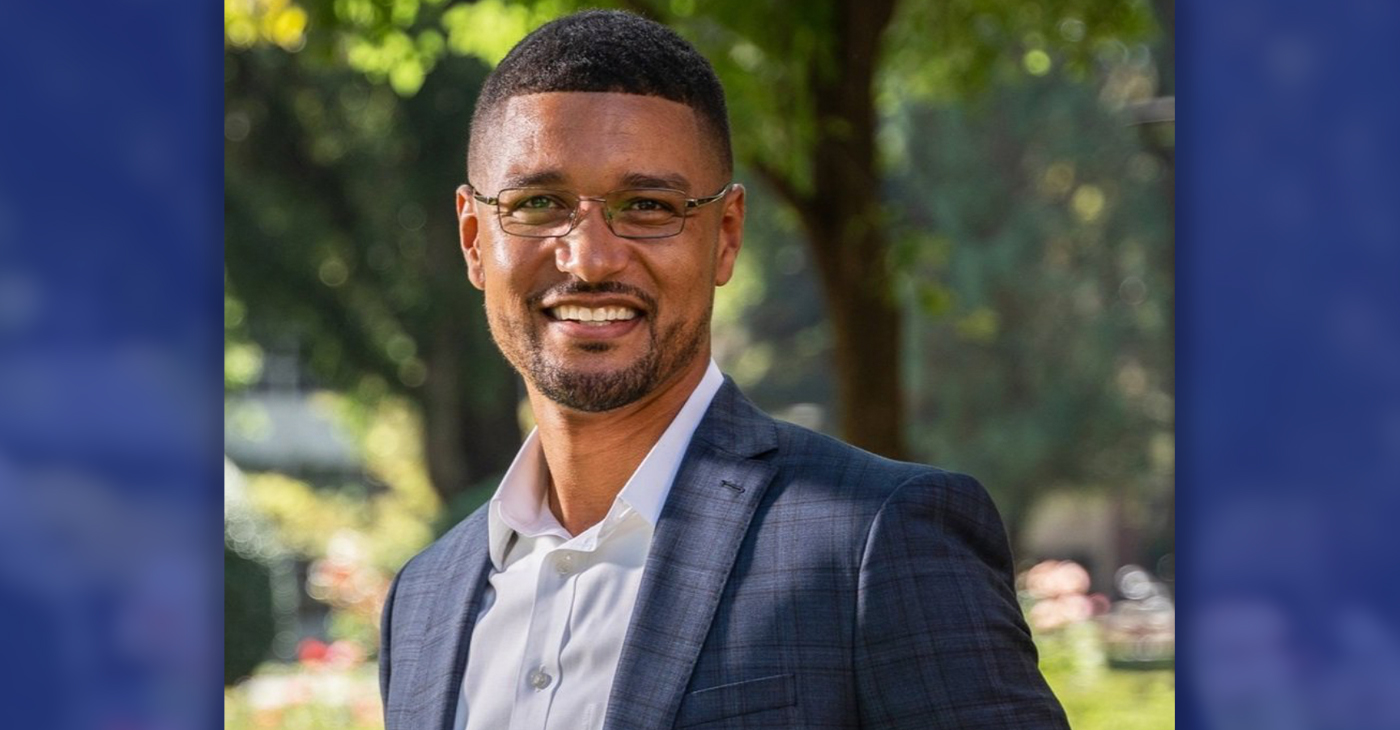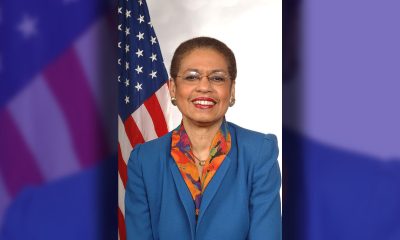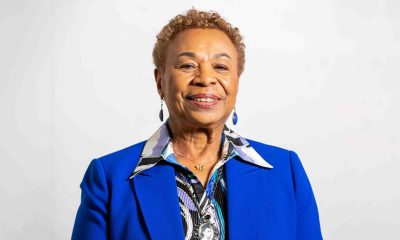Activism
2024 in Review: 7 Questions for Outgoing Stockton Mayor Kevin Lincoln
Lincoln’s decision to run for mayor stemmed from his love of people and his desire to serve his city. He prioritized resolving issues, including homelessness and public safety, among others. Lincoln, a Republican, will transition out of his role as mayor on Dec. 31, after an unsuccessful campaign to represent the 9th Congressional District.

By Edward Henderson
California Black Media
Born in Stockton, Mayor Kevin Lincoln says his Army upbringing inspired him to serve others.
Lincoln joined the United States Marine Corps in 2001 and was later assigned to Marine One, serving during President George W. Bush’s administration.
Following his military service, Lincoln worked for one of the nation’s top private security companies for eight years in Silicon Valley. In 2013, he resigned from his corporate position to give back to his community in Stockton through full-time ministry at a local church.
Lincoln’s decision to run for mayor stemmed from his love of people and his desire to serve his city. He prioritized resolving issues, including homelessness and public safety, among others.
Lincoln, a Republican, will transition out of his role as mayor on Dec. 31, after an unsuccessful campaign to represent the 9th Congressional District.
Recently, California Black Media (CBM) spoke with Lincoln. He reflected on his accomplishments this year and his goals moving forward.
Responses have been edited for length and clarity.
Looking back at 2024, what stands out to you as your most important achievement and why?
What I prioritize for our city council is our youth. They are the future — not only our city, but this region as a whole.
We were able to invest over $6 million in youth programming and workforce development, and partner with 14 different community-based organizations. We were able to employ over 600 young people through the city of Stockton. We launched even our first ever summer jobs program for the city of Stockton.
How did your leadership and investments contribute to improving the lives of Black Californians?
It’s about giving people a seat at the table, and not necessarily waiting for people to come to me, but me going to the community, making myself accessible, meeting our community at the point of their need, where they’re at.
What frustrated you the most over the last year?
It’s politics. Because unfortunately, there’s politics in everything. And I say politics impedes progress. You can have a policy, a solution that may not necessarily be 100% perfect. But it’s a good solution for everybody. But because we allow politics to get in the way based off our personal ideologies, oftentimes we can miss opportunities to make an impact for the benefit of the whole.
What inspired you the most over the last year?
My biggest inspiration has been the community and our ability to work together. What’s unique about Stockton, one in 20 jobs are nonprofit jobs in the city of Stockton and even San Joaquin County.
What is one lesson you learned in 2024 that will inform your decision-making next year?
To stay focused. In politics, there’s a lot of opportunity for distractions. There are a lot of influences from the outside — good, bad and indifferent. It’s important to stay focused, have a clear vision, and be committed to that vision.
In one word, what is the biggest challenge Black Californians face?
Economics. When the economy is not healthy, when we’re not thriving, we’re limited. Opportunities are limited.
What is the goal you want to achieve most in 2025?
I just want to continue to be a servant leader and serve our community in whatever capacity I am in.
Activism
Oakland Post: Week of November 26 – December 2, 2025
The printed Weekly Edition of the Oakland Post: Week of November 26 – December 2, 2025

To enlarge your view of this issue, use the slider, magnifying glass icon or full page icon in the lower right corner of the browser window.
Activism
Oakland Post: Week of November 19 – 25, 2025
The printed Weekly Edition of the Oakland Post: Week of November 19 – 25, 2025

To enlarge your view of this issue, use the slider, magnifying glass icon or full page icon in the lower right corner of the browser window.
Activism
IN MEMORIAM: William ‘Bill’ Patterson, 94
Bill devoted his life to public service and education. In 1971, he became the founding director for the Peralta Community College Foundation, he also became an administrator for Oakland Parks and Recreation overseeing 23 recreation centers, the Oakland Zoo, Children’s Fairyland, Lake Merritt, and the Henry J. Kaiser Convention Center.

William “Bill” Patterson, 94, of Little Rock, Arkansas, passed away peacefully on October 21, 2025, at his home in Oakland, CA. He was born on May 19, 1931, to Marie Childress Patterson and William Benjamin Patterson in Little Rock, Arkansas. He graduated from Dunbar High School and traveled to Oakland, California, in 1948. William Patterson graduated from San Francisco State University, earning both graduate and undergraduate degrees. He married Euradell “Dell” Patterson in 1961. Bill lovingly took care of his wife, Dell, until she died in 2020.
Bill devoted his life to public service and education. In 1971, he became the founding director for the Peralta Community College Foundation, he also became an administrator for Oakland Parks and Recreation overseeing 23 recreation centers, the Oakland Zoo, Children’s Fairyland, Lake Merritt, and the Henry J. Kaiser Convention Center.
He served on the boards of Oakland’s Urban Strategies Council, the Oakland Public Ethics Commission, and the Oakland Workforce Development Board.
He was a three-term president of the Oakland branch of the NAACP.
Bill was initiated in the Gamma Alpha chapter of Kappa Alpha Psi Fraternity.
In 1997 Bill was appointed to the East Bay Utility District Board of Directors. William Patterson was the first African American Board President and served the board for 27 years.
Bill’s impact reached far beyond his various important and impactful positions.
Bill mentored politicians, athletes and young people. Among those he mentored and advised are legends Joe Morgan, Bill Russell, Frank Robinson, Curt Flood, and Lionel Wilson to name a few.
He is survived by his son, William David Patterson, and one sister, Sarah Ann Strickland, and a host of other family members and friends.
A celebration of life service will take place at Henry J. Kaiser Convention Center (Calvin Simmons Theater) on November 21, 2025, at 10 AM.
His services are being livestreamed at: https://www.facebook.com/events/1250167107131991/
In lieu of flowers, donations can be made to the Euradell and William Patterson scholarship fund TBA.

-

 Activism3 weeks ago
Activism3 weeks agoOakland Post: Week of November 12 – 18, 2025
-

 Activism3 weeks ago
Activism3 weeks agoIN MEMORIAM: William ‘Bill’ Patterson, 94
-

 Activism3 weeks ago
Activism3 weeks agoHow Charles R. Drew University Navigated More Than $20 Million in Fed Cuts – Still Prioritizing Students and Community Health
-

 Bay Area3 weeks ago
Bay Area3 weeks agoNo Justice in the Justice System
-

 #NNPA BlackPress3 weeks ago
#NNPA BlackPress3 weeks agoThe Perfumed Hand of Hypocrisy: Trump Hosted Former Terror Suspect While America Condemns a Muslim Mayor
-

 #NNPA BlackPress2 weeks ago
#NNPA BlackPress2 weeks agoTrump’s Death Threat Rhetoric Sends Nation into Crisis
-

 #NNPA BlackPress4 weeks ago
#NNPA BlackPress4 weeks agoProtecting Pedophiles: The GOP’s Warped Crusade Against Its Own Lies
-

 #NNPA BlackPress2 weeks ago
#NNPA BlackPress2 weeks agoLewis Hamilton set to start LAST in Saturday Night’s Las Vegas Grand Prix


























































